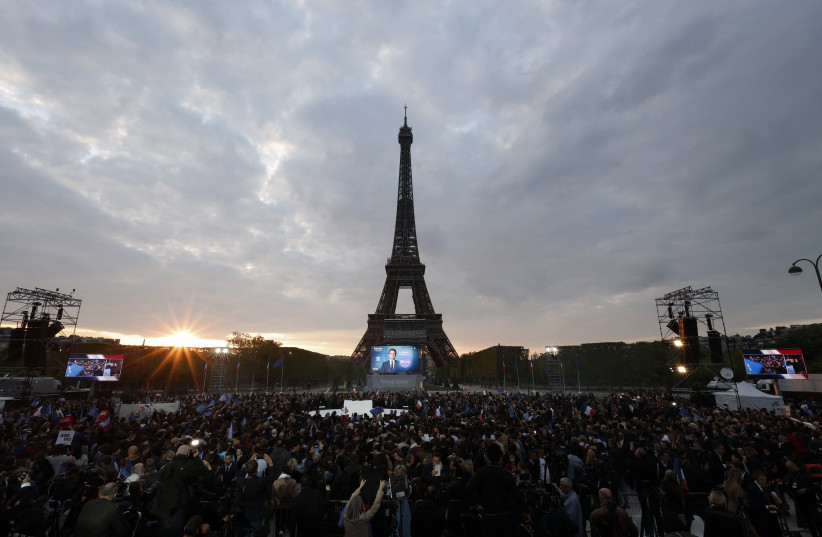PARIS – Fans of incumbent President Emmanuel Macron flocked to Paris’s Champs de Mars esplanade on Sunday evening to celebrate his unequivocal victory in the presidential runoff election.
At the foot of the Eiffel Tower, many of them chanted the same soccer-inspired slogan they have been chanting since the beginning of the campaign: “And One, and Two, and Five more years,” hailing a second (and final) five-year term for Macron at the Élysée Palace.
Supporters, many in their twenties and even younger, waved the Tricolore – but also the 12-starred blue flag of the European Union.
According to initial projections, which are normally very accurate, Macron defeated far-right rival Marine Le Pen by more than any of the polls predicted since the beginning of the race.
According to France 2 TV, Macron won by 58.2% to 41.8%, while BFMTV tallied the vote at 57.6% to 42.4%. Le Pen gained ground from her defeat five years ago – she received 33% of the vote – but it wasn’t enough.

Many in France sighed a great sigh of relief after polls closed at 8 p.m. They knew things could have ended up differently. Recent opinion polls were only placing Macron between 53% and 55%. Pollsters warned that their figures had a larger-than-usual margin of error due to the expected very low participation rate, which was estimated at close to 28%, the highest rate since 1969.
Macron’s victory is legitimate, but it nonetheless leaves French society divided more than it has ever been in decades. The right-wing party The Republicans and the left-wing party The Socialists both did poorly in the first round, practically shunned out of the political map. Their leaders have two months only to rebuild their shattered parties, before the June parliamentary elections.
French-Jewish leader and executive director of the France-European Leadership Network ELNET branch Arié Bensemhoun, who was present at Champs de Mars, said this was a great victory for Macron, but the results were troubling.
“That being said, more than 40% for the far Right is much too much. It leaves our society fractured, and it will be the responsibility of the president and those elected to the parliament to mend this rift. The danger of the far Right in France is not over. We won an important battle, but the fight must continue.”
Despite the margin of error, Macron’s supporters prepared for a win only, which is why they picked the Champs de Mars as a venue. At least 3,000 people, most of them activists and members of his party, arrived at the cordoned-off perimeter around the official stage, which has the Eiffel Tower as the impressive and symbolic background. More than 1,300 journalists asked for accreditation for the event, with many of them waiting long hours in line to get in to the press tent organized by Macron’s team.
Macron himself watched the preliminary results together with his wife and his campaign team in private, arriving at the esplanade to address his supporters after the tv networks’ announcements.
Le Pen’s staff, on the other hand, convened the journalists at the prestigious Pavillon d’Armenonville in the Boulogne Forest, which could house only a few hundred people at best. Should she have won, they planned to move the party to Place de la Concorde in the heart of Paris, a spot that has long been identified with France’s Right.
Le Pen arrived at the Pavillon at the beginning of the evening, staying in a VIP salon there to watch the results together with her sister, who accompanied her throughout the election campaign, and a few other close associates. Only 500 journalists asked for accreditation for Le Pen’s electoral evening, 300 of them foreign press, said Le Pen’s communication officials.
Le Pen said she considers her total of more than 40% “a brilliant victory.” Admitting she had lost the presidential battle, she committed to continuing her political engagement at the head of her party, saying she will now prepare for the parliamentary elections. She also said she had no intention of withdrawing from politics.
Jeanne, 21, a student at the Sorbonne, lives in the 11th Paris neighborhood in the east of the city. Many in this gentrified, liberal, middle-class area voted in the first round for extreme-left candidate Jean-Luc Mélenchon. Coming out of the polling station in a primary school next to her apartment on Sunday morning, Jeanne said she had voted for Macron, but with a heavy heart.
“Many of my friends from university decided not to vote at all,” she said. “Many of them marched last week in Paris with the labor unions and other left-wing groups, against voting for Le Pen. But in fact, they could not bring themselves to vote for Macron, whom they consider the president of the rich.”
Different voices could be heard on the Left Bank of Paris, at the 15th neighborhood in the west.
“I voted for Emmanuel Macron in the first round, and I will vote for him again today. He is carrying a true European project. He is practically the only leader in Europe to do that. He showed his resoluteness and strength in the Ukraine crisis,” said 27-year-old Gabriel, who works form a start-up firm.
Unconfirmed reports this afternoon offered Le Pen clear victory in the French overseas territories. They said Le Pen received almost 70% in the Caribbean’s Guadeloupe and more than 60% in nearby Martinique, an impressive achievement for the far-right leader in electoral sectors that only recently considered her hostile. In French Polynesia in the Pacific Ocean, Le Pen reportedly received only 48%. While these numbers were not official, Le Pen associates confirmed the trend to journalists.
But in contrast, Macron apparently won the votes of most French citizens abroad, with more than 80% supporting him in Argentina, Brazil and Canada. In the US, more than 90% of those who went to the polling booths voted for Macron.
Reuters contributed to this report.
